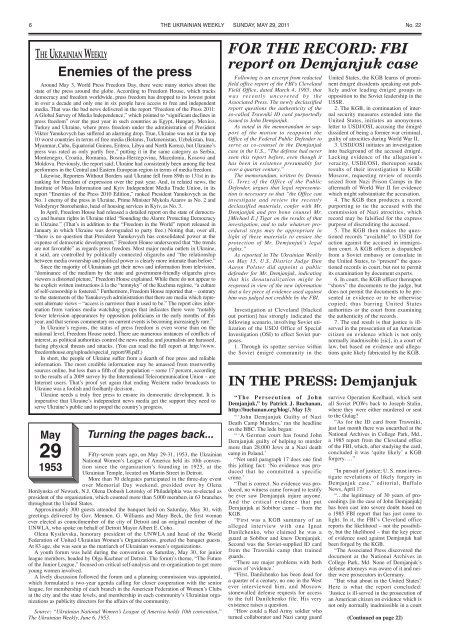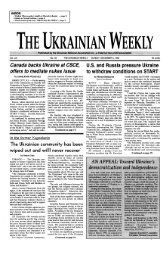Lutsenko goes on trial - The Ukrainian Weekly
Lutsenko goes on trial - The Ukrainian Weekly
Lutsenko goes on trial - The Ukrainian Weekly
You also want an ePaper? Increase the reach of your titles
YUMPU automatically turns print PDFs into web optimized ePapers that Google loves.
6THE UKRAINIAN WEEKLY SUNDAY, MAY 29, 2011No. 22<strong>The</strong> <strong>Ukrainian</strong> <strong>Weekly</strong>Enemies of the pressAround May 3, World Press Freedom Day, there were many stories about thestate of the press around the globe. According to Freedom House, which tracksdemocracy and freedom worldwide, press freedom has dropped to its lowest pointin over a decade and <strong>on</strong>ly <strong>on</strong>e in six people have access to free and independentmedia. That was the bad news delivered in the report “Freedom of the Press 2011:A Global Survey of Media Independence,” which pointed to “significant declines inpress freedom” over the past year in such countries as Egypt, Hungary, Mexico,Turkey and Ukraine, where press freedom under the administrati<strong>on</strong> of PresidentViktor Yanukovych has suffered an alarming drop. True, Ukraine was not in the top10 worst countries in terms of free media (Belarus, Turkmenistan, Uzbekistan, Iran,Myanmar, Cuba, Equatorial Guinea, Eritrea, Libya and North Korea), but Ukraine’spress was rated as <strong>on</strong>ly partly free,” putting it in the same category as Serbia,M<strong>on</strong>tenegro, Croatia, Romania, Bosnia-Herzegovina, Maced<strong>on</strong>ia, Kosovo andMoldova. Previously, the report said, Ukraine had c<strong>on</strong>sistently been am<strong>on</strong>g the bestperformers in the Central and Eastern European regi<strong>on</strong> in terms of media freedom.Likewise, Reporters Without Borders said Ukraine fell from 89th to 131st in itsranking for freedom of expressi<strong>on</strong> over the past year. And, in related news, theInstitute of Mass Informati<strong>on</strong> and Kyiv Independent Media Trade Uni<strong>on</strong>, in itsreport “Enemies of the Press 2010 Editi<strong>on</strong>,” ranked President Yanukovych as theNo. 1 enemy of the press in Ukraine, Prime Minister Mykola Azarov as No. 2 andVolodymyr Storozhenko, head of housing services in Kyiv, as No. 3.In April, Freedom House had released a detailed report <strong>on</strong> the state of democracyand human rights in Ukraine titled “Sounding the Alarm: Protecting Democracyin Ukraine.” (That’s in additi<strong>on</strong> to the “Freedom in the World” report released inJanuary in which Ukraine was downgraded to party free.) Noting that, over all,“there is no questi<strong>on</strong> that President Yanukovych has c<strong>on</strong>solidated power at theexpense of democratic development,” Freedom House underscored that “the trendsare not favorable” as regards press freedom. Most major media outlets in Ukraine,it said, are c<strong>on</strong>trolled by politically c<strong>on</strong>nected oligarchs and “the relati<strong>on</strong>shipbetween media ownership and political power is clearly more intimate than before.”Since the majority of <strong>Ukrainian</strong>s get their news and informati<strong>on</strong> from televisi<strong>on</strong>,“dominance of the medium by the state and government-friendly oligarchs givesviewers a distorted picture,” Freedom House explained. While there do not appear tobe explicit written instructi<strong>on</strong>s à la the “temnyky” of the Kuchma regime, “a cultureof self-censorship is fostered.” Furthermore, Freedom House reported that – c<strong>on</strong>traryto the statements of the Yanukovych administrati<strong>on</strong> that there are media which representalternate views – “access is narrower than it used to be.” <strong>The</strong> report cites informati<strong>on</strong>from various media watchdog groups that indicates there were “notablyfewer televisi<strong>on</strong> appearances by oppositi<strong>on</strong> politicians in the early m<strong>on</strong>ths of thisyear, and that serious commentary <strong>on</strong> current events is becoming increasingly rare.”In Ukraine’s regi<strong>on</strong>s, the status of press freedom is even worse than <strong>on</strong> thenati<strong>on</strong>al level, Freedom House noted. <strong>The</strong>re are numerous instances of c<strong>on</strong>flicts ofinterest, as political authorities c<strong>on</strong>trol the news media; and journalists are harassed,facing physical threats and attacks. (You can read the full report at http://www.freedomhouse.org/uploads/special_report/98.pdf.)In short, the people of Ukraine suffer from a dearth of free press and reliableinformati<strong>on</strong>. <strong>The</strong> most credible informati<strong>on</strong> may be amassed from trustworthysources <strong>on</strong>line, but less than a fifth of the populati<strong>on</strong> – some 17 percent, accordingto the results of a 2009 survey by the Internati<strong>on</strong>al Telecommunicati<strong>on</strong> Uni<strong>on</strong> – areInternet users. That’s proof yet again that ending Western radio broadcasts toUkraine was a foolish and foolhardy decisi<strong>on</strong>.Ukraine needs a truly free press to ensure its democratic development. It isimperative that Ukraine’s independent news media get the support they need toserve Ukraine’s public and to propel the country’s progress.May291953Turning the pages back...Fifty-seven years ago, <strong>on</strong> May 29-31, 1953, the <strong>Ukrainian</strong>Nati<strong>on</strong>al Women’s League of America held its 10th c<strong>on</strong>venti<strong>on</strong>since the organizati<strong>on</strong>’s founding in 1925, at the<strong>Ukrainian</strong> Temple, located <strong>on</strong> Martin Street in Detroit.More than 70 delegates participated in the three-day eventover Memorial Day weekend, presided over by OlenaHordynska of Newark, N.J. Olena Dobush Lototsky of Philadelphia was re-elected aspresident of the organizati<strong>on</strong>, which counted more than 5,000 members in 63 branchesthroughout the United States.Approximately 300 guests attended the banquet held <strong>on</strong> Saturday, May 30, withgreetings delivered by Gov. Mennen. G. Williams and Mary Beck, the first womanever elected as councilmember of the city of Detroit and an original member of theUNWLA, who spoke <strong>on</strong> behalf of Detroit Mayor Albert E. Coho.Olena Kysilevska, h<strong>on</strong>orary president of the UNWLA and head of the WorldFederati<strong>on</strong> of United <strong>Ukrainian</strong> Women’s Organizati<strong>on</strong>s, greeted the banquet guests.At 83 age, she was seen as the matriarch of <strong>Ukrainian</strong> women’s organizati<strong>on</strong>s.A youth forum was held during the c<strong>on</strong>venti<strong>on</strong> <strong>on</strong> Saturday, May 30, for juniorleague members, headed by Olga Kachner of Detroit. <strong>The</strong> forum’s theme, “<strong>The</strong> Futureof the Junior League,” focused <strong>on</strong> critical self-analysis and re-organizati<strong>on</strong> to get moreyoung women involved.A lively discussi<strong>on</strong> followed the forum and a planning commissi<strong>on</strong> was appointed,which formulated a two-year agenda calling for closer cooperati<strong>on</strong> with the seniorleague, for membership of each branch in the American Federati<strong>on</strong> of Women’s Clubsat the city and the state levels, and membership in each community’s <strong>Ukrainian</strong> organizati<strong>on</strong>sas publicity directors for the affairs of the community.Source: “<strong>Ukrainian</strong> Nati<strong>on</strong>al Women’s League of America holds 10th c<strong>on</strong>venti<strong>on</strong>,”<strong>The</strong> <strong>Ukrainian</strong> <strong>Weekly</strong>, June 6, 1953.FOR THE RECORD: FBIreport <strong>on</strong> Demjanjuk caseFollowing is an excerpt from redactedfield office report of the FBI’s ClevelandField Office, dated March 4, 1985, thatwas recently uncovered by theAssociated Press. <strong>The</strong> newly declassifiedreport questi<strong>on</strong>s the authenticity of theso-called Trawniki ID card purportedlyissued to John Demjanjuk.As noted in the memorandum in supportof the moti<strong>on</strong> to reappoint theOffice of the Federal Public Defender toserve as co-counsel in the Demjanjukcase in the U.S., “<strong>The</strong> defense had neverseen this report before, even though ithas been in existence presumably forover a quarter century.”<strong>The</strong> memorandum, written by DennisG. Terez of the Office of the PublicDefender, argues that legal representati<strong>on</strong>is necessary so that “the Office caninvestigate and review the recentlydeclassified materials, c<strong>on</strong>fer with Mr.Demjanjuk and pro b<strong>on</strong>o counsel Mr.[Michael E.] Tigar <strong>on</strong> the results of thatinvestigati<strong>on</strong>, and to take whatever proceduralsteps may be appropriate inlight of these materials to ensure theprotecti<strong>on</strong> of Mr. Demjanjuk’s legalrights.”As reported in <strong>The</strong> <strong>Ukrainian</strong> <strong>Weekly</strong><strong>on</strong> May 15, U.S. District Judge DanAar<strong>on</strong> Polster did appoint a publicdefender for Mr. Demjanjuk, indicatingthat his denaturalizati<strong>on</strong> might bereopened in view of the new informati<strong>on</strong>that a key piece of evidence used againsthim was judged not credible by the FBI.Investigati<strong>on</strong> at Cleveland [blackedout porti<strong>on</strong>] has str<strong>on</strong>gly indicated thefollowing scenario, involving Soviet utilizati<strong>on</strong>of the USDJ Office of SpecialInvestigati<strong>on</strong> (OSI) to effect Soviet purposes.1. Through its spotter service withinthe Soviet émigré community in the“ T h e P e r s e c u t i o n o f J o h nDemjanjuk,” by Patrick J. Buchanan,http://buchanan.org/blog/, May 13:“ ‘John Demjanjuk Guilty of NaziDeath Camp Murders,’ ran the headline<strong>on</strong> the BBC. <strong>The</strong> lede began:“ ‘A German court has found JohnDemjanjuk guilty of helping to murdermore than 28,000 Jews at a Nazi deathcamp in Poland.’“Not until paragraph 17 does <strong>on</strong>e findthis jolting fact: ‘No evidence was producedthat he committed a specificcrime.’“That is correct. No evidence was produced,no witness came forward to testifyhe ever saw Demjanjuk injure any<strong>on</strong>e.And the critical evidence that putDemjanjuk at Sobibor came – from theKGB.“First was a KGB summary of analleged interview with <strong>on</strong>e IgnatDanilchenko, who claimed he was aguard at Sobibor and knew Demjanjuk.Sec<strong>on</strong>d was the Soviet-supplied ID cardfrom the Trawniki camp that trainedguards.“<strong>The</strong>re are major problems with bothpieces of ‘evidence.’“First, Danilchenko has been dead fora quarter of a century, no <strong>on</strong>e in the Westever interviewed him, and Moscowst<strong>on</strong>ewalled defense requests for accessto the full Danilchenko file. His veryexistence raises a questi<strong>on</strong>.“How could a Red Army soldier whoturned collaborator and Nazi camp guardUnited States, the KGB learns of prominentémigré dissidents speaking out publiclyand/or leading émigré groups inoppositi<strong>on</strong> to the Soviet leadership in theUSSR.2. <strong>The</strong> KGB, in c<strong>on</strong>tinuati<strong>on</strong> of internalsecurity measures extended into theUnited States, initiates an an<strong>on</strong>ymousletter to USDJ/OSI, accusing the émigrédissident of being a former war criminal,guilty of atrocities during World War II.3. USDJ/OSI initiates an investigati<strong>on</strong>into background of the accused émigré.Lacking evidence of the allegati<strong>on</strong>’sveracity, USDJ/OSI, thereup<strong>on</strong> sendsresults of their investigati<strong>on</strong> to KGB/Moscow, requesting review of recordsseized from Nazi Pris<strong>on</strong> Camps in theaftermath of World War II for evidencewhich might substantiate the accusati<strong>on</strong>.4. <strong>The</strong> KGB then produces a recordpurporting to tie the accused with thecommissi<strong>on</strong> of Nazi atrocities, whichrecord may be falsified for the expresspurpose of discrediting the accused.5. <strong>The</strong> KGB then makes the questi<strong>on</strong>edrecords “available” to USDJ foracti<strong>on</strong> against the accused in immigrati<strong>on</strong>court. A KGB officer is dispatchedfrom a Soviet embassy or c<strong>on</strong>sulate inthe United States, to “present” the questi<strong>on</strong>edrecords in court, but not to permitits examinati<strong>on</strong> by document experts.6. In court, the KGB officer thereup<strong>on</strong>“shows” the documents to the judge, butdoes not permit the documents to be presentedin evidence or to be otherwisecopied; thus barring United Statesauthorities or the court from examiningthe authenticity of the records.7. <strong>The</strong> end result is that justice is illservedin the prosecuti<strong>on</strong> of an Americancitizen <strong>on</strong> evidence which is not <strong>on</strong>lynormally inadmissible [sic], in a court oflaw, but based <strong>on</strong> evidence and allegati<strong>on</strong>squite likely fabricated by the KGB.IN THE PRESS: Demjanjuksurvive Operati<strong>on</strong> Keelhaul, which sentall Soviet POWs back to Joseph Stalin,where they were either murdered or sentto the Gulag?“As for the ID card from Trawniki,just last m<strong>on</strong>th there was unearthed at theNati<strong>on</strong>al Archives in College Park, Md.,a 1985 report from the Cleveland officeof the FBI, which, after studying the card,c<strong>on</strong>cluded it was ‘quite likely’ a KGBforgery. …”“In pursuit of justice; U. S. must investigaterevelati<strong>on</strong>s of likely forgery inDemjanjuk case,” editorial, BuffaloNews, April 17:“…the legitimacy of 30 years of proceedings[in the case of John Demjanjuk]has been cast into severe doubt based <strong>on</strong>a 1985 FBI report that has just come tolight. In it, the FBI’s Cleveland officereports the likelihood – not the possibility,but the likelihood – that the key pieceof evidence used against Demjanjuk hadbeen forged by the KGB.“<strong>The</strong> Associated Press discovered thedocument at the Nati<strong>on</strong>al Archives inCollege Park, Md. N<strong>on</strong>e of Demjanjuk’sdefense attorneys was aware of it and neitherwere prosecutors in Germany.“But what about in the United States?Here is what the report c<strong>on</strong>cluded:‘Justice is ill-served in the prosecuti<strong>on</strong> ofan American citizen <strong>on</strong> evidence which isnot <strong>on</strong>ly normally inadmissible in a court(C<strong>on</strong>tinued <strong>on</strong> page 22)
















